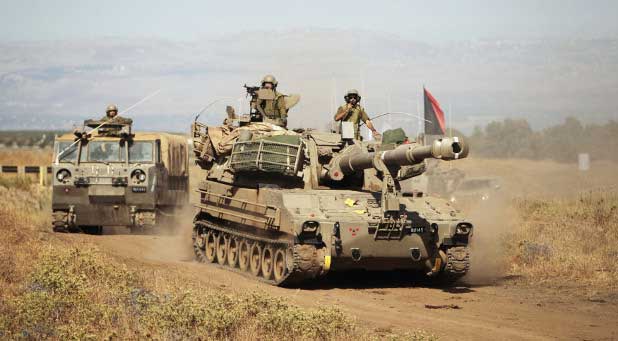The average Israeli may not be noticing, but the ground is shaking beneath our feet. While newspaper headlines are dealing with the Bar Noar shooting arrests and the state budget, the Israeli leadership’s main focus is on another crucial issue—Syria.
It is hard to overstate the potential volatility of the Syrian front. On the surface, the situation looks like business as usual, if the Syrian civil war can be called usual. The civil war occasionally spills into our territory, but not enough to trouble the residents of the Golan Heights or the throngs of tourists who flock there.
All of the news appears to be developments that do not directly concern us—the defeat of the rebels in Qusair, the Syrian military’s offensive in Hama, the growing involvement of Hezbollah and Russia in the conflict and the outrageous vacillation of the U.S. and Europe.
Nevertheless, the situation in Syria is giving Israel’s leaders a pounding headache. In recent days, following the victory of his forces in Qusair, Syrian President Bashar Assad has regained the confidence that he lost over the past two years. He also displayed chutzpah with new, overt threats issued toward Israel.
Right now, Israel’s concerns are not about a direct war with Syria (Assad understood Avigdor Lieberman’s warning when Lieberman said such a conflict would cost Assad his whole world). Rather, Israel is worried about “other” Syrian responses to reported Israeli airstrikes in its territory, like an attack on an Israeli embassy, airplane or group of tourists overseas. This would send a clear message of revenge without leaving behind any fingerprints. Hezbollah knows how to carry out such attacks, as does Iran, and they might even use a third-party terrorist group to put as much distance as possible between the Syrian regime and the attack.
But a revenge attack like this, as troubling as it would be, is not Israel’s top fear. When Defense Minister Moshe (Bogie) Ya’alon meets this coming weekend with U.S. military officials in Washington, he will talk about Hezbollah’s growing involvement in the fighting in Syria (for which Hezbollah will receive advanced weaponry in return) and the escalating rhetoric of Russia.
Russia’s open support for the Assad regime is an act of defiance against the U.S. that also significantly harms Israel. Ya’alon will tell his American hosts that if the U.S. does not stop the current trends, Israel may be again forced into action, which this time could deteriorate into a regional war or even conflict between global powers.
Again, there are almost no signs of this complex situation above the surface. While the Israel Defense Forces (IDF) is on high alert in the Golan Heights, with many troops deployed in the area, the tension is far from the public consciousness. Of course, there are some who will claim that this is just another well-staged chapter of the IDF’s battle against expected budget cuts. However, the answer to such charges is that even the finance minister, who is a member of the cabinet, is familiar with the situation and knows how small the distance is between the current quiet and a big explosion.
For the original article, visit israelhayom.com.
















































